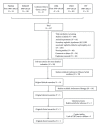Astragalus in the prevention of upper respiratory tract infection in children with nephrotic syndrome: evidence-based clinical practice - PubMed (original) (raw)
Astragalus in the prevention of upper respiratory tract infection in children with nephrotic syndrome: evidence-based clinical practice
Chuan Zou et al. Evid Based Complement Alternat Med. 2013.
Abstract
Aims. To explore whether Astragalus or its formulations could prevent upper respiratory infection in children with nephrotic syndrome and how best to use it. Methods. We transformed a common clinical question in practice to an answerable question according to the PICO principle. Databases, including the Cochrane Library (Issue 5, 2012), PUBMED (1966-2012.8), CBM (1978-2012.8), VIP (1989-2012.8), and CNKI (1979-2012.8), were searched to identify Cochrane systematic reviews and clinical trials. Then, the quality of and recommendations from the clinical evidence were evaluated using the GRADEpro software. Results. The search yielded 537 papers. Only two studies with high validity were included for synthesis calculations. The results showed that Astragalus granules could effectively reduce URTI in children with nephrotic syndrome compared with prednisone treatment alone (23.9% versus 42.9%; RR = 0.56 and 95% CI = 0.33-0.93). The dose of Astragalus granules was 2.25 gram (equivalent to 15 gram crude Astragalus) twice per day, at least for 3-6 months. The level of evidence quality was low, but we still recommended the evidence to the patient according to GRADEpro with the opinion of the expert. Followup showed the incidence of URTI in this child decreased significantly. Conclusions. Astragalus granules may reduce the incidence of URTI in children with nephrotic syndrome.
Figures
Figure 1
Search process: flow diagram of included and excluded studies. A search for relevant studies was performed using the PubMed database, Embase, Cochrane library, CNKI, CBM, and VIP subsequently filtered out based on the inclusion/exclusion described.
Similar articles
- Interventions for preventing infection in nephrotic syndrome.
Wu HM, Tang JL, Cao L, Sha ZH, Li Y. Wu HM, et al. Cochrane Database Syst Rev. 2012 Apr 18;2012(4):CD003964. doi: 10.1002/14651858.CD003964.pub3. Cochrane Database Syst Rev. 2012. PMID: 22513919 Free PMC article. Review. - Corticosteroid therapy for nephrotic syndrome in children.
Hodson EM, Knight JF, Willis NS, Craig JC. Hodson EM, et al. Cochrane Database Syst Rev. 2003;(1):CD001533. doi: 10.1002/14651858.CD001533. Cochrane Database Syst Rev. 2003. PMID: 12535410 Updated. Review. - Corticosteroid therapy for nephrotic syndrome in children.
Hodson EM, Knight JF, Willis NS, Craig JC. Hodson EM, et al. Cochrane Database Syst Rev. 2004;(2):CD001533. doi: 10.1002/14651858.CD001533.pub2. Cochrane Database Syst Rev. 2004. PMID: 15106158 Updated. Review. - Interventions for idiopathic steroid-resistant nephrotic syndrome in children.
Liu ID, Willis NS, Craig JC, Hodson EM. Liu ID, et al. Cochrane Database Syst Rev. 2019 Nov 21;2019(11):CD003594. doi: 10.1002/14651858.CD003594.pub6. Cochrane Database Syst Rev. 2019. PMID: 31749142 Free PMC article. - [Systematic evaluation and Meta-analysis on effectiveness and safety of Yupingfeng Granules on recurrent respiratory tract infection].
Zhang LD, Lyu J, Xie YM, Sun MH. Zhang LD, et al. Zhongguo Zhong Yao Za Zhi. 2019 Oct;44(20):4379-4386. doi: 10.19540/j.cnki.cjcmm.20190729.502. Zhongguo Zhong Yao Za Zhi. 2019. PMID: 31872622 Chinese.
Cited by
- Infections and risk of end-stage renal disease in patients with nephrotic syndrome: a nationwide population-based case-control study.
Lin CH, Hung PH, Liu WS, Hu HY, Chung CJ, Chen TH. Lin CH, et al. Ann Transl Med. 2020 Mar;8(5):228. doi: 10.21037/atm.2020.01.02. Ann Transl Med. 2020. PMID: 32309375 Free PMC article. - The Efficacy of Hydroxychloroquine Combined with Huangqi Tablets in the Treatment of Diabetic Nephropathy.
Chen X, Sheng D, Kong X. Chen X, et al. J Healthc Eng. 2021 Oct 18;2021:7988924. doi: 10.1155/2021/7988924. eCollection 2021. J Healthc Eng. 2021. PMID: 34707799 Free PMC article. Retracted. - Oral Astragalus (Huang qi) for preventing frequent episodes of acute respiratory tract infection in children.
Su G, Chen X, Liu Z, Yang L, Zhang L, Stålsby Lundborg C, Wen Z, Guo X, Qin X, Liang J, Liu X. Su G, et al. Cochrane Database Syst Rev. 2016 Dec 1;12(12):CD011958. doi: 10.1002/14651858.CD011958.pub2. Cochrane Database Syst Rev. 2016. PMID: 27905672 Free PMC article. Review.
References
- McIntyre P, Craig JC. Prevention of serious bacterial infection in children with nephrotic syndrome. Journal of Paediatrics and Child Health. 1998;34(4):314–317. - PubMed
- Du PF, Zhu SR, Wang GP. An analysis for nosocomial infection in primary nephrotic syndrome—a report of 125 cases. Chinese Journal of Clinical Pediatrics. 1996;14(1):35–36.
- Wu QY, Wu X. Clinical study of gammaglobulin on upper respiratory infection prevention in nephrotic syndrome children. Journal of Hainan Medical College. 2009;15(8):879–880.
- Wu B, Xu NF. Clinical epidemiology study on risk factors for nosocomial infection in children with nephrotic syndrome. Chinese Journal of Nosocomiology. 2000;10(3):34–35.
- MacDonald NE, Wolfish N, McLaine P, Phipps P, Rossier E. Role of respiratory viruses in exacerbations of primary nephrotic syndrome. Journal of Pediatrics. 1986;108(3):378–382. - PubMed
LinkOut - more resources
Full Text Sources
Other Literature Sources
